Literary rating: ★★★★
Kick-butt quotient: ☆☆½
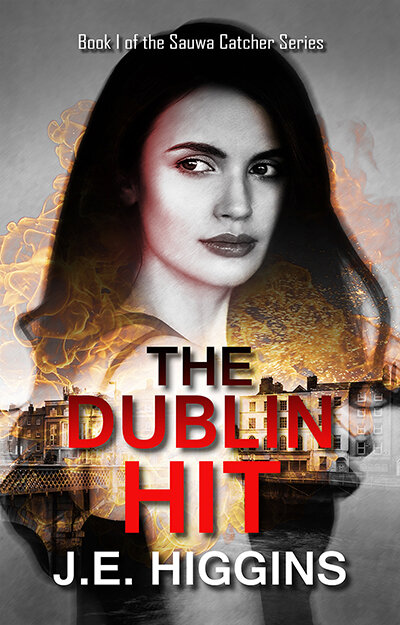 What’s most unusual about this book is its heroine. For many years, Sauwa Catcher operated as a killer for the racist South African government during the apartheid years, hunting down their enemies at home at abroad, and gaining the justifiable nickname ‘Angel of Death’ as a result. Yeah. This is not exactly the kind of person with whom you should expect to sympathize. Indeed, generally someone like this would be the villain of the piece, yet Higgins manages to make it work, far better than you would expect.
What’s most unusual about this book is its heroine. For many years, Sauwa Catcher operated as a killer for the racist South African government during the apartheid years, hunting down their enemies at home at abroad, and gaining the justifiable nickname ‘Angel of Death’ as a result. Yeah. This is not exactly the kind of person with whom you should expect to sympathize. Indeed, generally someone like this would be the villain of the piece, yet Higgins manages to make it work, far better than you would expect.
This takes place not long after the fall of that regime in the nineties, when South Africa set up a “Truth and Reconciliation Commission”, to come to terms with the crimes previously committed. Catcher had been operating in the UK, and with her support network gone, accepts a commission from a Northern Irish paramilitary group, the Ulster Volunteer Force. In exchange for funding Sauwa’s vanishing off the grid, they want her to assassinate a leading Republic of Ireland police officer, who has been feeding intel to the UVF’s mortal enemies, the IRA. But doing so will bring down not just the wrath of the Irish police, but also the IRA. Additionally, her South African past is trying to catch up with Sauwa, as one of the most notorious tools of the old government, and a team has been sent over to bring her to justice. They’re in for quite a hard task.
So, how do you make the tool of an infamously racist regime sympathetic? Mostly, it’s by carefully crafting her background. Sauwa in not South African, but came from Rhodesia, now known as Zimbabwe. That country had its similarly racist government replaced with something arguably worse, in the shape of dictator Robert Mugabe, and she saw her family slaughtered in the wholesale violence which followed. Sauwa became a refugee, moved to South Africa, and vowed to do whatever she could to prevent the same thing happening there. That started her down the current career path. It’s a case where you may not agree with the character’s decisions, yet you can see the logic in them. Even the black soldiers hunting her, former “terrorists” themselves, know where she’s coming from, and are similarly haunted by their experiences. One of them says, “I feel more akin to her – another fighter in the trenches.”
It also helps that Sauwa only kills when necessary. Though, of course, her definition of “necessary” is perhaps different to yours and mine! There is only one extended action sequence, a night battle between Sauwa and an IRA unit on a beach. That’s mostly because she is simply better than everyone else in terms of experience and tactics, that while there are other conflicts, they are over pretty quickly. Her behaviour is as much about, for example, being aware of her environment and making sure she is not walking into a trap. Here, Higgins’s military experience does seem to prove useful, and strikes a nice balance between not enough explanation and over-burdening the reader with unnecessary detail. I’m very much interested in seeing where the story goes from here.
Author: J.E. Higgins
Publisher: Mercenary Publishing, available through Amazon, both as a paperback and an e-book
1 of 3 in the Sauwa Catcher series.





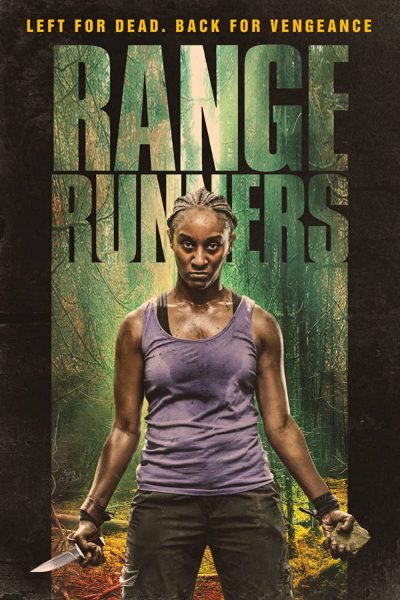 Mel (Cooper) is engaged on a project of running the Appalachian Trail (or a convincing facsimile thereof), with some help from her sister, who meets her at various points to provide support and fresh supplies. Mel is currently on her own, starting an eight-day section of the hike where she’ll be out of contact. However, she bumps into a couple of suspicious characters, deep in the woods: Wayland (Leonard) and his partner, Jared (Woods). Initially, it seems like a creepy, but one-off random meeting. It turns out to be considerably more and subsequent encounters escalate, until Mel is sent plummeting over the edge of a drop-off, badly injuring her leg, but in possession of something very important to Wayland and Jared. Will she be able to escape her pursuers and make it to safety?
Mel (Cooper) is engaged on a project of running the Appalachian Trail (or a convincing facsimile thereof), with some help from her sister, who meets her at various points to provide support and fresh supplies. Mel is currently on her own, starting an eight-day section of the hike where she’ll be out of contact. However, she bumps into a couple of suspicious characters, deep in the woods: Wayland (Leonard) and his partner, Jared (Woods). Initially, it seems like a creepy, but one-off random meeting. It turns out to be considerably more and subsequent encounters escalate, until Mel is sent plummeting over the edge of a drop-off, badly injuring her leg, but in possession of something very important to Wayland and Jared. Will she be able to escape her pursuers and make it to safety?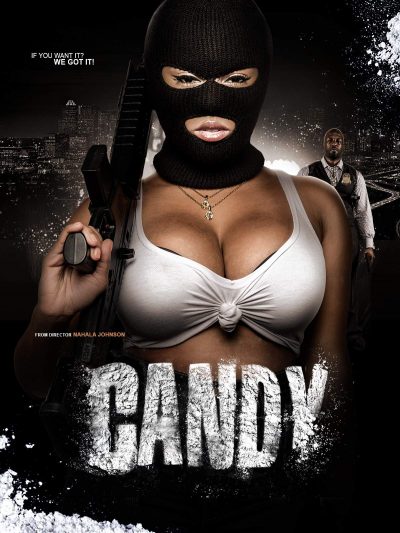 You’ll probably understand why that cover picture got me to pause my casual scrolling through Amazon Prime. Well played, movie producers. Well played… Likely inevitably, the film didn’t quite live up to the advertising, mostly due to a significant lack of plot. The film barely runs 65 minutes, before we get to a sloth-like end-credit crawl, and there’s probably not enough story-line to fill a music video for one of the gangster rap songs which pepper the soundtrack. Yet, in terms of atmosphere and setting, it
You’ll probably understand why that cover picture got me to pause my casual scrolling through Amazon Prime. Well played, movie producers. Well played… Likely inevitably, the film didn’t quite live up to the advertising, mostly due to a significant lack of plot. The film barely runs 65 minutes, before we get to a sloth-like end-credit crawl, and there’s probably not enough story-line to fill a music video for one of the gangster rap songs which pepper the soundtrack. Yet, in terms of atmosphere and setting, it  This was among the very last of the “pinky violence” films made by the
This was among the very last of the “pinky violence” films made by the  While ultimately hamstrung, not least by its limited resources – this cost a mere five thousand dollars – it does what low-budget films should generally tend to do. That is, go where their better-off siblings dare not tread. In this case, that’s the forbidden territory of religion. Two young, female missionaries, Amber (Durand) and Martha (Crosland) are going door-to-door, seeking souls they can save and bring into the body of their church – clearly Mormon, going by the reference to Salt Lake City among other things, though operating under a pseudonym here! While their attractive shape proves successful at getting them in the door, the residents who don’t live up to the ladies’ high moral standards are in for a shock. For the two kill non-believers, with Amber in particular, having a zero tolerance policy. And she considers herself “saved”, basically giving her a free pass to do anything necessary in the name of the Lord.
While ultimately hamstrung, not least by its limited resources – this cost a mere five thousand dollars – it does what low-budget films should generally tend to do. That is, go where their better-off siblings dare not tread. In this case, that’s the forbidden territory of religion. Two young, female missionaries, Amber (Durand) and Martha (Crosland) are going door-to-door, seeking souls they can save and bring into the body of their church – clearly Mormon, going by the reference to Salt Lake City among other things, though operating under a pseudonym here! While their attractive shape proves successful at getting them in the door, the residents who don’t live up to the ladies’ high moral standards are in for a shock. For the two kill non-believers, with Amber in particular, having a zero tolerance policy. And she considers herself “saved”, basically giving her a free pass to do anything necessary in the name of the Lord. When I first put this on, and saw it was only 41 minutes long, I thought there had been some kind of mistake. 41 minutes later, it was clear the mistake had been all mine. Additionally, I was now thoroughly grateful for the abbreviated running-time. A feature length edition would have constituted cruel and unusual punishment, and may be forbidden by the Geneva Convention. This blatant Buffy the Vampire Slayer knock-off is missing only two things: a budget, and everything else.
When I first put this on, and saw it was only 41 minutes long, I thought there had been some kind of mistake. 41 minutes later, it was clear the mistake had been all mine. Additionally, I was now thoroughly grateful for the abbreviated running-time. A feature length edition would have constituted cruel and unusual punishment, and may be forbidden by the Geneva Convention. This blatant Buffy the Vampire Slayer knock-off is missing only two things: a budget, and everything else. Natalia Nicolaeva in a 19-year-old, living with her parents on a farm in Transnistria, which I imagine most people would be hard-pushed to find on a map. Per Wikipedia, “it is a breakaway de facto state in a narrow strip of land between the river Dniester and the Ukrainian border that is internationally recognized as part of Moldova.” Now you know. She lets her friend, Sonia, convince her into taking up a job offer overseas which – probably inevitably – turns out to be the gateway to them becoming the victims of sex traffickers, imprisoned in a Turkish brothel. Natalia manages to escape, though pays a heavy price, and the man in charge of the gang, Goran Zigic, has not forgotten her either.
Natalia Nicolaeva in a 19-year-old, living with her parents on a farm in Transnistria, which I imagine most people would be hard-pushed to find on a map. Per Wikipedia, “it is a breakaway de facto state in a narrow strip of land between the river Dniester and the Ukrainian border that is internationally recognized as part of Moldova.” Now you know. She lets her friend, Sonia, convince her into taking up a job offer overseas which – probably inevitably – turns out to be the gateway to them becoming the victims of sex traffickers, imprisoned in a Turkish brothel. Natalia manages to escape, though pays a heavy price, and the man in charge of the gang, Goran Zigic, has not forgotten her either.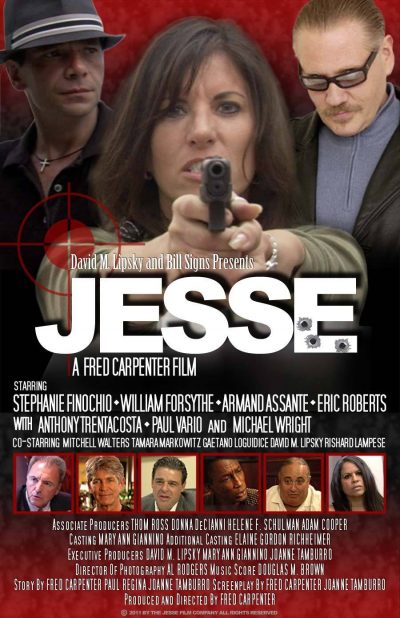 Jesse (Finochio) is a Long Island cop on the edgeTM. Since losing custody of her kids, she has gone into a downward spiral of drinking, casual relationships and taking her anger out on any perps unfortunate enough to cross her path. She has driven her captain (Vario) to the edge of distraction, and is perpetually feuding with her mother and brother. The latter dies in a road accident – only his foot is found! – but when Jesse and Mom go to cash in his life insurance policy, they get a shock. The beneficiary has been changed to be Ralph Sirna (Trentacosta), a notorious local gangster. Suddenly, the accident seems rather less accidental, and nothing – not her boss nor Sirna’s “godfather”, Vince (Forsythe) – will be able to stop her.
Jesse (Finochio) is a Long Island cop on the edgeTM. Since losing custody of her kids, she has gone into a downward spiral of drinking, casual relationships and taking her anger out on any perps unfortunate enough to cross her path. She has driven her captain (Vario) to the edge of distraction, and is perpetually feuding with her mother and brother. The latter dies in a road accident – only his foot is found! – but when Jesse and Mom go to cash in his life insurance policy, they get a shock. The beneficiary has been changed to be Ralph Sirna (Trentacosta), a notorious local gangster. Suddenly, the accident seems rather less accidental, and nothing – not her boss nor Sirna’s “godfather”, Vince (Forsythe) – will be able to stop her.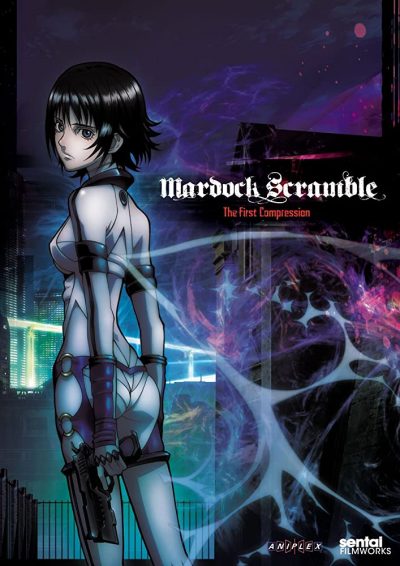 Originally a series of three novels by Tow Ubukata, then a manga series published from 2009-12, I can only presume that something was lost in the translation to these three short (~65 minutes each) movies. Actually, make that just about everything. For after a promising first entry, I can’t think of a franchise that fell so completely off the rails. Okay, maybe The Matrix, with which this shares similar problems: taking itself far too seriously, and diverting into social commentary for which no-one was asking. I gave serious consideration to bailing and make this a rare “Did not finish,” which I’d not even bother writing about. But perhaps if my experience can serve as a warning to others, the tedium will not have been experienced in vain.
Originally a series of three novels by Tow Ubukata, then a manga series published from 2009-12, I can only presume that something was lost in the translation to these three short (~65 minutes each) movies. Actually, make that just about everything. For after a promising first entry, I can’t think of a franchise that fell so completely off the rails. Okay, maybe The Matrix, with which this shares similar problems: taking itself far too seriously, and diverting into social commentary for which no-one was asking. I gave serious consideration to bailing and make this a rare “Did not finish,” which I’d not even bother writing about. But perhaps if my experience can serve as a warning to others, the tedium will not have been experienced in vain.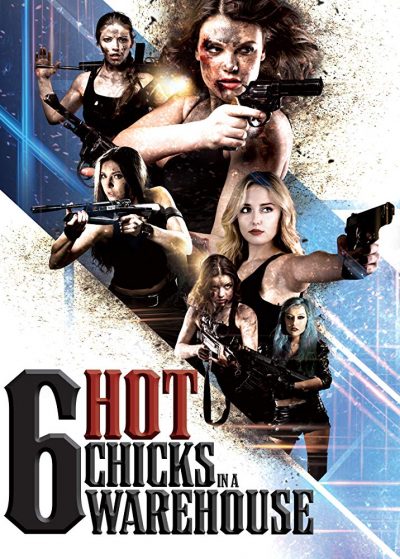 There are indeed, six reasonably attractive ladies here, and they do indeed spend most of the film in a warehouse. Can’t argue about that. The problems, unfortunately, are numerous, and start with the fact that 6HCiaW is not, in itself, a concept sufficient to sustain a feature. The half-dozen women in question are models, hired by moderately creepy photographer Adrian (Malam), for what he announces will be his final photoshoot before retiring. Which is a bit odd, since he looks no older than thirty. Whatevs. Unfortunately, after he overhears the models making fun of him, Ade goes a bit loopy – a situation not helped by the steroid-like substance “Pump ‘n’ Gro'” which he has been ingesting. So he locks the models up in cages, injects them with the same stuff, and makes them fight each other inside an electrified cage. As you do.
There are indeed, six reasonably attractive ladies here, and they do indeed spend most of the film in a warehouse. Can’t argue about that. The problems, unfortunately, are numerous, and start with the fact that 6HCiaW is not, in itself, a concept sufficient to sustain a feature. The half-dozen women in question are models, hired by moderately creepy photographer Adrian (Malam), for what he announces will be his final photoshoot before retiring. Which is a bit odd, since he looks no older than thirty. Whatevs. Unfortunately, after he overhears the models making fun of him, Ade goes a bit loopy – a situation not helped by the steroid-like substance “Pump ‘n’ Gro'” which he has been ingesting. So he locks the models up in cages, injects them with the same stuff, and makes them fight each other inside an electrified cage. As you do.